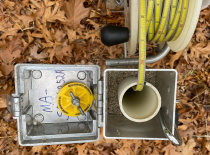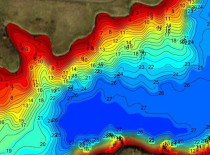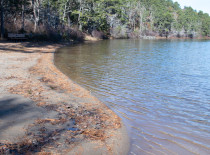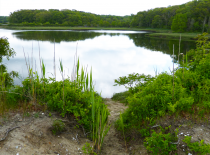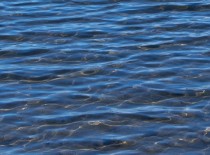Category: Water Quality
In 2022, the Cape Cod Commission debuted the High Groundwater Levels Data Viewer, providing a more accessible, up-to-date way to estimate seasonal high groundwater levels anywhere on Cape Cod. Recently refreshed with visual and usability updates, the Viewer continues to serve as an essential resource for engineers, surveyors, septic professionals, and local officials.
Across the region, efforts to collect and compile pond data are expanding. One of the most significant data gaps in fully assessing pond health is bathymetry, the measurement of the depth and shape of a water body’s bottom, essentially, an underwater topographic map. Bathymetric data describe how deep a pond is at various locations, the contours of the pond floor, and changes in depth that influence how water moves and mixes. To address this need, the Cape Cod Commission is initiating a project to survey bathymetry in approximately 30 ponds across the region.
The Cape Cod and Islands Water Protection Fund Management Board took final action to advance eight clean water infrastructure projects in six Cape Cod towns this week. The Board previously approved conditional subsidies for eligible projects included on the Massachusetts Department of Environmental Protection’s Clean Water Intended Use Plans in 2023 and 2024.
For the past three years, the Cape Cod Commission and the Association to Preserve Cape Cod have collaborated on the Cape Cod Regional Pond Monitoring Program (RPMP), an effort to collect consistent data from 50 representative ponds across the region. Since the spring of 2023, monitors, including hundreds of volunteers, have made nearly 1,000 visits to ponds, collecting almost 3,000 samples. Now, at the end of its initial three-year run, the program has brought new insight, new capabilities, and a new level of community involvement to understanding pond health across Cape Cod. Now, the Commission is seeking to expand the program and continue it for years to come.
Natural systems are central to Cape Cod’s identity and resilience, shaping the region’s environment, economy, and quality of life. A series of lightning talks by Commission staff highlighted efforts to protect ponds, enhance outdoor access, and build resilience in the face of climate stress, sharing practical actions communities and residents can take.
At this year's OneCape Conference, Erin Perry, Deputy Director of the Cape Cod Commission, reflected on the 10-year journey since the adoption of the region's Section 208 Water Quality Management Plan. She reminded the audience that in 2015, wastewater was the central topic of discussion: "Ten years ago at OneCape, all we talked about was wastewater - it was the entire content of the summit."
The Cape Cod Commission is pleased to announce the release of the final Freshwater Strategy, a comprehensive, data-driven plan that defines a path forward for Cape Cod to support healthy, functioning ponds and lakes.
Unanticipated changes to the Clean Water State Revolving Fund’s financing of local wastewater projects have prompted urgent action from local officials.
On January 13, 2025, the CCIWPF Board voted to approve two key motions to enhance financial support for water quality monitoring programs, highlighting their connection to the Fund's mission. These programs aim to improve the understanding of both coastal and freshwater ecosystems, ensuring informed, science-based decision-making for the region.
As work on the Cape Cod Freshwater Initiative nears completion, the Cape Cod Commission is pleased to present new tools and resources to support the region’s freshwater ponds.
